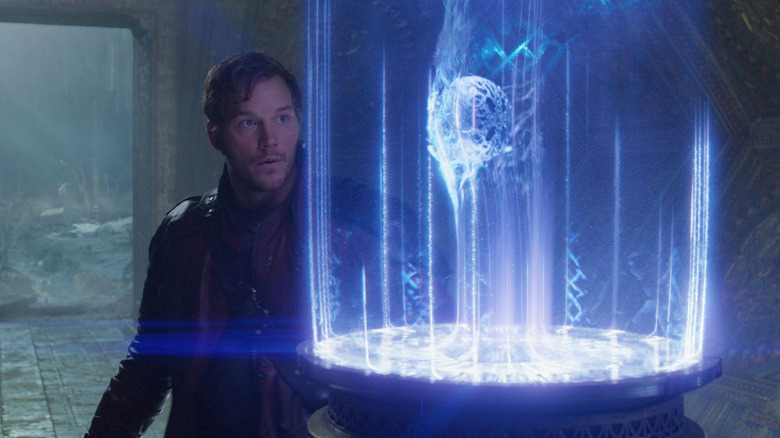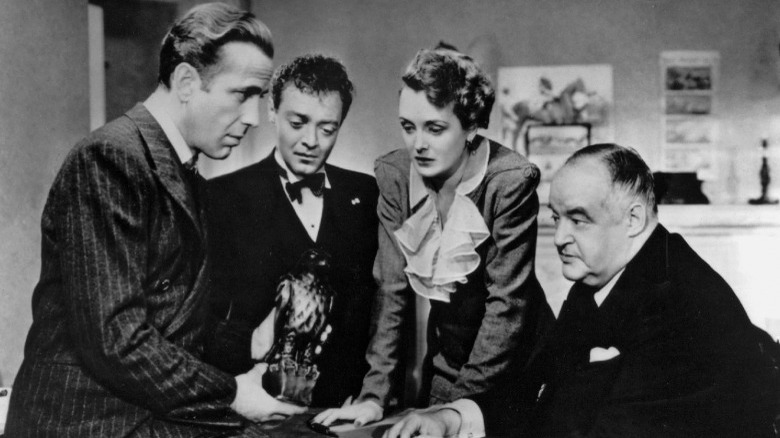The Guardians Of The Galaxy Reference To Maltese Falcon Explained For The Uninitiated
Spend enough time reading about movies, and sooner than later, you're bound to stumble upon the term "MacGuffin." There are many oft-cited examples of this particular trope, including the titular item in "The Maltese Falcon," the microfilm in "North by Northwest," and the Ark of the Covenant in "Raiders of the Lost Ark." Star-Lord even calls attention to the way the Power Stone acts as a MacGuffin in the first "Guardians of the Galaxy" film, at one point noting that it has "a real Ark of the Covenant, Maltese Falcon vibe." But what does that even mean?
To start, let's take a closer look at "The Maltese Falcon." Released in 1941, John Huston's classic noir movie (itself adapted from Dashiell Hammett's 1930 novel of the same name) stars Humphrey Bogart as Sam Spade, a hard-edged San Francisco private detective who finds himself entangled in a web of murder and deceit after taking on a new client in the form of a woman who calls herself Ruth Wonderly (Mary Astor). At the heart of the film's plot is the coveted Maltese Falcon, the history of which is summarized in a title card that comes after the opening credits. It reads:
"In 1539, the Knight Templars of Malta, paid tribute to Charles V of Spain, by sending him a Golden Falcon encrusted from beak to claw with rarest jewels — but pirates seized the galley carrying this priceless token and the fate of the Maltese Falcon remains a mystery to this day."
We don't talk about MacGuffins, no, no, no
In its oldest form, a MacGuffin was a "thing" (be it an item, object, organization, and so on) that served to motivate a story's characters, but also one that was otherwise irrelevant to the plot at hand and usually left intentionally vague. Writer Angus MacPhail, who often worked with director Alfred Hitchcock, was credited for coining the term by filmmaker Ivor Montagu (another frequent Hitchcock collaborator). In the latter's words:
"It was Angus [MacPhail] who established the term 'MacGuffin' for the unknown plot objective which you did not need to choose until the story planning was complete. (This convenient word Hitch gleefully adopted and used to the end of his career.)"
Indeed, Hitchcock's thrillers are notorious (pun sorta intended) for using MacGuffins to drive their stories, be they the titular spy agency in "The 39 Steps," the mysterious tune in "The Lady Vanishes," or, again, the microfilm in "North by Northwest." One could even argue Lars Thorwald's mistress in "Rear Window" qualifies as a MacGuffin. After all, like the items listed here, she herself is unimportant to the film's story beyond offering motivation for Thorwald to murder his wife. (Not to mention, the movie only affords the briefest of glimpses at her from a distance.)
The Falcon in "The Maltese Falcon" operates along these same lines. The details the movie provides about it only matter inasmuch as they establish the Falcon is a priceless historical artifact and, as such, something the film's many unsavory characters would love to get their hands on. Beyond that, however, none of this information actually impacts the movie's story, nor does it have any particular thematic relevance.
The evolution of the MacGuffin
As with other movie tropes, the MacGuffin has evolved since the days of Hitchcock, not least of all thanks to George Lucas and his writing on the Indiana Jones films. As he explained to Vanity Fair in 2008, Lucas thinks a good MacGuffin should matter to the audience viewing a movie as much as much as it does to the characters within the movie. He cited the Ark in "Raiders of the Lost Ark" as an example of a "perfect" MacGuffin. Not only do those watching the film clearly understand why it's vital for Indy to get his hands on the artifact before the Nazis do, the Ark also ties directly into the movie's use of religious iconography and allusions to the greater battle between the forces of good and evil throughout history.
Obviously, the Power Stone in "Guardians of the Galaxy" can't compete with the Ark in "Raiders of the Lost Ark" when it comes to all-time great MacGuffins, and it doesn't try to, either. That being said, it functions closer to what Lucas sees as an ideal MacGuffin than the Maltese Falcon. Not only does "Guardians" take the time to get its audience invested in its heroes' efforts to prevent the stone from falling into the wrong hands, the magical purple rock ultimately plays a pivotal role in Star-Lord and the other Guardians' arcs in the film's climax. This, in turn, makes Peter Quill's shout-out to "The Maltese Falcon" one that carries deeper meaning beyond your typical, "I understood that reference" appreciation (to use an all-too-relevant meme).


